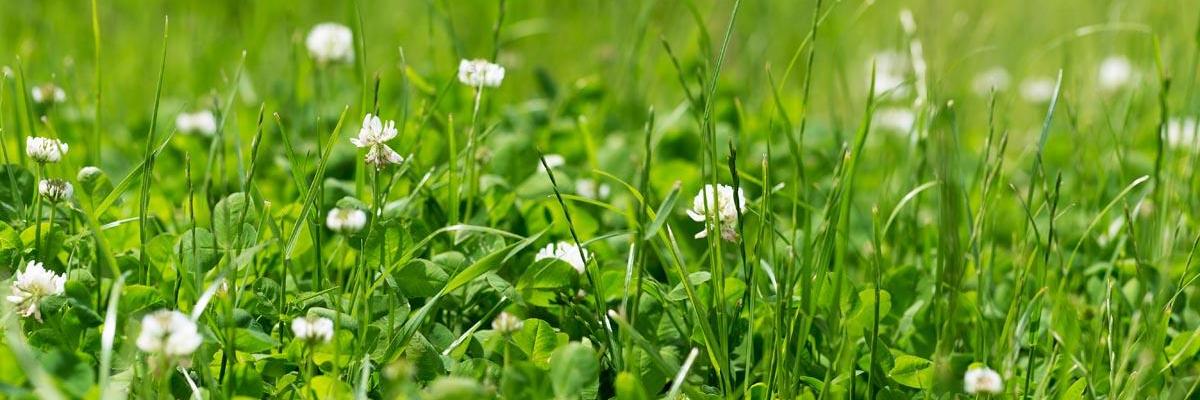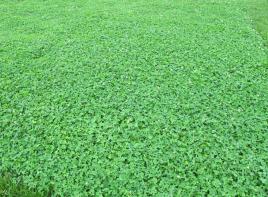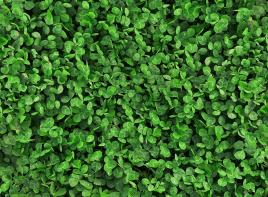Soil, Sun, and Moisture Factors
Clover lawns are drought tolerant and prefer shady areas, making clover perfect for supplementing shaded or dead areas of your yard. It doesn’t need to be watered or mowed as often as a traditional lawn.
Clover does well in the heat after it has taken root, but the seeds shouldn’t be planted during prolonged heat since it makes it harder for the seeds to take root.
Clover plants should be planted 4-6 weeks before your first frost date in the Fall or as early as two weeks before your last frost date in the spring. Clover is a perennial plant that goes dormant over the winter and re-grows in the spring, making it more resistant to cold temperatures once it has taken root and grown into the lawn.
Types of Clover Seed
There are two main types of clover seed: Microclover seed and White Dutch Clover seed.
Microclover
Microclover, also known as the dwarf variety of Dutch white clover (Trifolium repens var. Pipolina) — a popular choice for clover lawns due to its small size — grows around 3 to 6 inches tall and has a flat, even appearance.
Unlike regular Dutch clover, microclover doesn't grow in clumps, has smaller leaves, and produces fewer flowers. Its slower growth and reduced aggressiveness make it less likely to crowd out other plants, allowing it to integrate well with other grasses.
Additionally, the tiny leaves of microclover enable it to withstand more wear and tear, making it a durable option for lawns.
White Dutch Clover
White clover — or Dutch clover (Trifolium repens) — is a versatile and widely recognized variety of clover. It grows taller than microclover, ranging between 4 to 8 inches tall.
This type of clover is highly favored for lawns and can also serve as a perennial cover crop, ground cover, or erosion control solution. Its charming, round, white flowers add a picturesque touch to clover lawns and occasionally present the sought-after lucky four-leaf clover.
Dutch White Clover seed can be a perfect addition to your turf lawn and grows excellently on its own.
7 Advantages of Adding Clover Seed to Grass
There are many advantages to adding clover seed to your grass. Below we will discuss the seven main advantages:
Fertilizes Grass
Clover is a legume that takes nitrogen from the air and transports it into the soil through its roots. The nitrogen in the soil acts as a natural fertilizer and provides further benefits to your lawn. This added nitrogen can make your grass greener and healthier. Plus, it reduces the need for fertilizer.
When clover roots decompose in the soil, they also provide fertilizing benefits. The decomposing roots deposit something called macropores into the soil, helping the clover and any nearby plants stay healthy. These macropores also attract earthworms that help keep the soil loose — eliminating the need for aeration — and reduce thatch buildup.
You can plant clover seeds for lawn maintenance and improvement since the natural fertilizers will aid grass and other nearby plants.
Weed Blocker
Clover can be an excellent weed blocker in your yard. Since clover grows densely, it can crowd your yard and prevent weed seeds from forming in the soil. When fewer of their seeds can take root, fewer weeds crop up, so you do not need to use herbicides or weed killers on your lawn. In fact, you should avoid herbicides since many herbicides also kill clover.
Reduces Risk of Lawn Disease
Lawn diseases can devastate a yard, but clover can help prevent these disastrous nightmares. Clover makes the grass less likely to become diseased because it draws up and accumulates trace minerals in the soil that could cause disease. It also releases healthy minerals into the soil.
Yellow spots on your grass, caused by pesky chafer beetles, can be eliminated with clover because adult chafer beetles aren’t attracted to legumes. If the beetles were on your lawn before the clover cropped up, they would move away from your yard to lay their eggs elsewhere.
Low Maintenance
Clover is incredibly low-maintenance compared to grass. Since clover is low-growing, you do not need to worry about mowing your lawn as often. If you don’t mind sweet-smelling flowers coming up, you never really have to mow them.
Clover mixes well with other grasses and keeps them and the grass around them greener, even with less water. Depending on the region, clover is semi-evergreen or evergreen, meaning it keeps its green color all season long and only fades when it goes dormant for the winter.
When mixed with grass, clover lawns become a soft, cool surface pleasant to walk on (even barefoot). As long as it is mixed with grass, it remains durable against heavy foot or pet traffic and is less likely to show wear and tear, making it perfect for families with children or pets.
Clover is also great for pet owners because dog urine doesn’t discolor clover like most grasses. Even if dogs use it frequently, the color will remain fairly green.
Natural Aeration
Core aeration is beneficial for turf health, but it can be time-consuming when done independently and costly if outsourced to a lawn care company.
Fortunately, clover serves as a living mulch, enriching the soil with nutrients and aiding in its resistance to compaction. Clover roots also create macropores as they decompose, attracting earthworms that naturally keep the soil loose, eliminating the need for additional aeration and preventing thatch buildup.
Less Water Use
Since clover is fairly drought-tolerant, you can save time and money watering your lawn. Clover can hold water for longer and even help keep grass hydrated between waterings. However, if you frequently mow a clover lawn or live in an area with a lot of sun and little rainfall or humidity, you will still need to water semi-frequently.
Attracts Pollinators
The white flowers on white clovers attract pollinators like bees and butterflies. Pollinators can help your yard and garden become more lively and support the natural ecosystem in your area.
Clover also attracts other beneficial insects and wildlife, which can help support the natural environment around you and beautify your yard.
Cost-effective
Clover is incredibly cost-effective. In most areas, you can cover 1,000 square feet for around $1 worth of seed.
Since clover also doesn’t need to be watered, mowed, or covered in pest and weed control as often, if at all, you will save a lot on expenses you otherwise had with an entire grass lawn.
Downsides of Planting Clover Seeds
There are some potential downsides to clover that you should consider before planting a clover lawn or mixing clover with your grass.
Less Durable
Clover is less durable under foot traffic than grass. A pure clover lawn can only handle low to moderate foot traffic. However, a mixed clover and grass lawn can withstand moderate to high foot traffic.
Can stain clothes
Clover stains clothes more easily than turf grass, so it may not be the best choice if you are worried about getting grass stains out of clothing.
Has to be Reseeded
Clover is a perennial plant that doesn’t last as long as grass. You will likely have to reseed your clover every two to three years.
Bees
If you are allergic to bees or are worried about children or other guests getting bee stings, clover may not be your best option since it is excellent at attracting pollinators like bees. However, mowing your clover before it blossoms with flowers can reduce the number of bees in your yard.
Can Compete With Grass
Clover is a fast-growing and dense plant, so if you mix it with grass, it can end up competing with the grass and overtaking it. Since clover provides natural nutrients and fertilizer, unlike grass, it is more likely to help your grass stay healthy rather than overtake it.
How to Plant Clover Seeds
Timing
For best results, you should plant Microclover 4-6 weeks before the average first frost date in the Fall or as early as two weeks before the last frost date in the Spring. These times may change depending on your area and the weather conditions of the year. You should avoid planting during prolonged hot weather.
Preparation
If you want an all-clover lawn, you will need to start by removing the grass from your lawn to eliminate competition. Then, once you remove the lawn, you can plant the seeds in the soil and wait for growth.
For a mixed lawn, simply seed the clover over the top of the grass. Rake or scratch the surface of the area where you want to plant the clover and add the seeds in, then wait for beautiful clovers to start to grow.
If you also need to plant more grass, you could mix the clover and grass seeds to cover the lawn and create a clover-grass blend.
Seeding
Sow clover seed at a rate of roughly 6 to 8 ounces per 1,000 square feet. Scatter the seeds densely and gently rake them into the soil at a depth of no more than 5–10 mm (1/8–1/4"). For better coverage, seed at a higher rate and keep 15–20% of the seeds to fill any bald areas later.
Watering
Water lightly or regularly mist the soil after seeding until the clover establishes itself. During the first two weeks, keep the seeds wet, providing water daily until the roots grow and germinate. After the seeds have established themselves, you can water them less frequently.
Maintenance
Do not fertilize your clover lawn, as it's unnecessary. Mow and water the clover lawn as required. Remember that clover goes dormant over the winter and re-grows in the spring.
Whether planting from scratch or transitioning an existing lawn, the best time to start your clover lawn is in early spring, after the last frost has passed and temperatures are no longer dipping below 40 degrees Fahrenheit.
For a fresh start, mix clover seeds with compost, soil, or sand before spreading them evenly. Keep the seeds wet for the first few weeks, watering daily until germination.
For a transition, first, sprinkle a thin layer of fertilizer over your lawn to improve soil health. Then mix the clover seed with compost and spread the mixture over the lawn. Keep the seeds moist during the initial weeks, watering daily without rain.
With proper care and timing, your clover lawn will thrive and offer numerous benefits to your landscape.
Buy Clover Seeds from Nature’s Seed
Say goodbye to costly and time-consuming core aeration — clover's natural ability to nourish the soil and resist compaction will revolutionize your lawn care routine.
Our carefully selected seeds are the finest quality clover seeds available. They could be the key to achieving a beautiful, eco-friendly clover lawn requiring less maintenance.
Nature Seed’s Microclover and White Dutch Clover lawn seed are excellent options for creating a clover lawn or adding clover to your existing turf lawn. Discover the secret to a lush and thriving lawn with our premium Microclover seeds and White Dutch Clover seeds!







